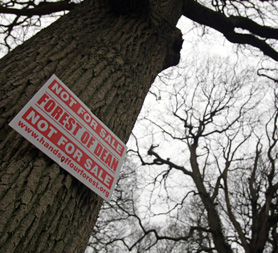Forest sell-off: ‘This is what people power looks like’
Environment Minister Caroline Spelman admits: “I’m sorry, we got this wrong” over the forest sell-off. Gaby Hinsliff says the Government has to be prepared to be unpopular on some policies.

The Government backed down over the plan after it hit opposition from many sides.
Ms Spelman told Parliament that a consultation on the proposals for the forests had shown that most groups opposed them. She also said that speaking to MPs had made it clear that many had concerns about the plans.
She said; “Our aim in all of this was to do more to enhance the public benefits delivered by forests. We have spoken to the RSPB, the Woodland Trust, the Wildlife Trust and the Ramblers as well as other organisations. I’m sorry we got this wrong, but we have listened to people’s concerns.
People say it doesn’t make a difference but we have proved those people wrong. 38 Degrees’ David Babbs, who campaigned against the forest sell-off
The Government was consulting on the proposal that ancient woodland such as the New Forest and the Forest of Dean would be transferred into private hands. This would have included charitable trusts, community and other local groups. Forests with a commercial value would be leased to private operators. Campaign groups say they are delighted by the decision.
Campaign
When details of the sell-off began to emerge, an energetic campaign sprung up to stop it going ahead. Five days before the proposal was formally launched on 27 January, a YouGov poll found that 2 per cent of people asked supported the idea and 84 per cent were strongly against it. The grassroots website 38 Degrees started a petition which now has over half a million signatures.
Speaking to Channel 4 News, 38 Degrees’ David Babbs said the u-turn was clear evidence that campaigns can influence policy.
He said: “People say it doesn’t make a difference but we have proved those people wrong. Over 100 thousand people emailed their MP and thousands donated to fund newspaper adverts. People had intelligent and deep concerns about this policy and MPs realised it was a policy that nobody wanted.”
He said the victory has given his members confidence to push forward with other campaigns; “This will give people confidence for other campaigns. People have been contacting us saying ‘bring on the next one’ and lots are making comparisons with our campaign to save the NHS.”
U-turns
"The Government has to decide how much flak they are prepared to take and how much they are prepared to be disliked," Gaby Hinsliff, former political editor of the Observer, told Channel 4 News.
"If you look at the amount of u-turns they have gone through, they are small each time but they seem to back down quite easily. That will encourage people to put up a fight about every proposal. You can't have the deepest spending cuts in a generation if half the time you go back on them when there is trouble.
"Caroline Spelman has screwed up royally but plenty of people around her are paid to stop that happening. The Government made a big deal about not needing as many special advisors as Labour - then lo and behold they do need them, especially because a Coalition Government increases the workload.
"The problem with this policy is that they didn't try to sell it in advance to any of the interested parties. For example the National Trust could have benefited by taking over woodland but the Government didn't try to get them onside in the first place. Nobody seemed to perceive that people would feel emotional about woodlands."
So will the Government end up backtracking in other areas? Gaby Hinsliff thinks the Goverment can get away with proposals that are unpopular as long as they are well thought out.
"They are pushing forward where their arguments are well-prepared," she said.
"For example people might think the welfare bill is unfair or too harsh but it's not going to be picked apart on grounds of basic competence because it has roots a long way back. The Centre for Social Justice was working on it five years ago. I think the one thing that is vulnerable is NHS reforms. People haven't been prepared for it, people who might have supported it have not been brought on side, the detail has not been entirely nailed down. That is the next area where things might be chipped away at."
-
Latest news
-
As India goes to the polls in the world’s largest election – what do British-Indians think?6m

-
Tees Valley: Meet the candidates in one of the biggest contests coming up in May’s local elections4m

-
Keir Starmer says public sector reform will be a struggle7m

-
Nicola Sturgeon’s husband Peter Murrell charged with embezzlement of funds from SNP1m

-
Ukraine might finally get $60billion in American weapons and assistance to defend against Russia3m

-




